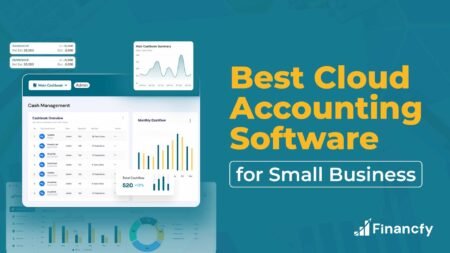
Cloud Accounting Software for Small Businesses
In the digital age, small businesses face the challenge of managing their finances efficiently while keeping costs low. Cloud accounting software has emerged as a game-changer, providing accessible, scalable, and cost-effective solutions tailored for small businesses. This article explores the best cloud accounting software options available for small businesses, highlighting their features, benefits, and how they can streamline financial management.
1. What is Cloud Accounting Software?
Cloud accounting software allows businesses to manage their financial operations online without the need for local installation. With data stored in the cloud, users can access their financial information from anywhere, making it easier to collaborate and manage accounts on the go.
2. Benefits of Cloud Accounting Software for Small Businesses
- Accessibility: Access your financial data anytime, anywhere, as long as you have an internet connection. This is especially beneficial for remote teams or business owners who travel frequently.
- Cost-Effectiveness: Most cloud accounting solutions operate on a subscription model, which can be more affordable than traditional software that requires significant upfront costs.
- Automatic Updates: Cloud software providers regularly update their platforms, ensuring users have access to the latest features and security enhancements without additional costs.
- Scalability: As your business grows, cloud accounting software can easily adapt by allowing you to add features, users, and integrations without major overhauls.
3. Key Features to Look for in Cloud Accounting Software
When choosing cloud accounting software for your small business, consider the following features:
- Invoicing and Billing: Look for software that allows you to create and send professional invoices, set up recurring billing, and track payments.
- Expense Tracking: The ability to categorize and track expenses helps you manage cash flow effectively.
- Bank Reconciliation: Automated bank feeds can simplify the reconciliation process, ensuring your financial records match your bank statements.
- Reporting and Analytics: Robust reporting features can provide insights into your business’s financial health, helping you make informed decisions.
- Multi-User Access: Ensure the software allows multiple users with different permission levels, enabling collaboration among team members.
4. Top Cloud Accounting Software for Small Businesses
Here are some of the best cloud accounting software options available for small businesses:
1. QuickBooks Online
QuickBooks Online is one of the most popular cloud accounting solutions for small businesses. It offers a wide range of features, including invoicing, expense tracking, and financial reporting.
- Features: Automated invoicing, expense categorization, bank reconciliation, and financial reporting.
- Pricing: Plans start at $25 per month.
- Best For: Small to medium-sized businesses looking for a comprehensive accounting solution.
2. Xero
Xero is known for its user-friendly interface and strong reporting capabilities. It’s particularly popular among freelancers and small businesses.
- Features: Invoicing, expense tracking, inventory management, and multi-currency support.
- Pricing: Plans start at $13 per month.
- Best For: Small businesses that need robust reporting and multi-currency support.
3. FreshBooks
FreshBooks is designed with small service-based businesses in mind. It offers features tailored for freelancers and consultants, such as time tracking and project management.
- Features: Time tracking, invoicing, expense management, and project tracking.
- Pricing: Plans start at $15 per month.
- Best For: Freelancers and service-based businesses.
4. Zoho Books
Zoho Books is part of the Zoho suite of applications, making it an excellent option for businesses already using Zoho’s other products. It offers a comprehensive set of features at a competitive price.
- Features: Invoicing, expense tracking, project management, and automated workflows.
- Pricing: Plans start at $20 per month.
- Best For: Small businesses and startups looking for an all-in-one solution.
5. Wave
Wave is a free accounting software that’s perfect for very small businesses or freelancers. While it offers many features at no cost, additional services like payroll do come with fees.
- Features: Invoicing, expense tracking, accounting, and receipt scanning.
- Pricing: Free for core features, with paid add-ons for payroll and payments.
- Best For: Startups and freelancers looking for a free, user-friendly accounting solution.
5. How to Choose the Right Cloud Accounting Software
Selecting the right cloud accounting software depends on your specific business needs. Consider the following:
- Assess Your Needs: Identify the key features you need based on your business size and industry.
- Budget: Determine how much you are willing to spend on accounting software.
- User-Friendly Interface: Choose software that is easy to navigate to minimize the learning curve for you and your team.
- Customer Support: Look for providers that offer reliable customer support, as this can be invaluable when you encounter issues or need assistance.
6. Conclusion
Cloud accounting software is a valuable tool for small businesses looking to streamline their financial management. With options like QuickBooks Online, Xero, FreshBooks, Zoho Books, and Wave, there’s a solution for every need and budget. By leveraging cloud accounting software, small businesses can enhance productivity, improve cash flow management, and focus on growth.
FAQs
1. What is cloud accounting software?
Cloud accounting software is an online platform that allows businesses to manage their finances from anywhere, offering features like invoicing, expense tracking, and reporting.
2. Is cloud accounting software secure?
Most reputable cloud accounting software providers use advanced encryption and security measures to protect your financial data.
3. Can I access my accounting software on mobile devices?
Yes, many cloud accounting software solutions offer mobile apps, allowing you to manage your finances on the go.
4. What features should I look for in cloud accounting software?
Key features include invoicing, expense tracking, bank reconciliation, reporting, and multi-user access.
5. Are there free cloud accounting software options?
Yes, Wave offers a free version with essential accounting features, making it suitable for freelancers and very small businesses.
